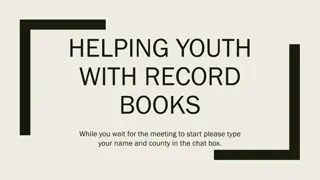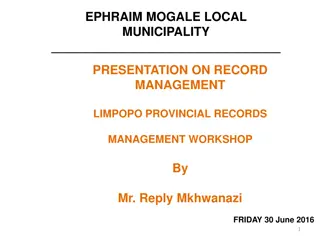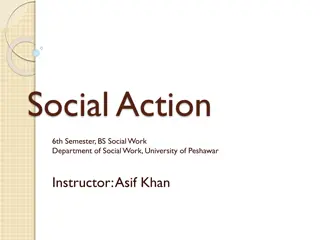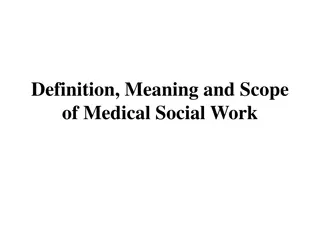Importance of Record Keeping in Social Work Practice
Effective record keeping is crucial in social work practice as it enables social workers to document client information, track interventions, evaluate progress, and ensure accountability. Communication and recording skills are vital for providing quality services to individuals, families, groups, and communities.
Download Presentation

Please find below an Image/Link to download the presentation.
The content on the website is provided AS IS for your information and personal use only. It may not be sold, licensed, or shared on other websites without obtaining consent from the author. Download presentation by click this link. If you encounter any issues during the download, it is possible that the publisher has removed the file from their server.
E N D
Presentation Transcript
After the interviewing process is over the caseworker has the obligation to record the interview. The language of interview now has to be translated into the language of the record (file, forms, and computer).
Record keeping is an important component of social work practice. Social workers keeps records to document and retain (recall) information about their clients and about the process and progress of their services. Individual records are used in planning, implementing and evaluating services to each client. Aggregated records are used in planning, monitoring and evaluating services to groups of clients. The record is a focal point for accountability to the client, to the organization and to the profession. 3
Communication is essential in social work. How we speak and how we listen have enormous impact on how well we do our jobs and how successful communication is also absolutely necessary if we are going to be helpful to clients, whether those clients are individuals, families, groups, organizations or whole communities. we are in them. Effective 4
Recording is a written record of an interaction with a client. Recording is a major learning tool in social case work. Social case work is unique in its heavy dependence on process recording to teach intervention skills. Because in social case work the practitioner s major tool is one's self and one's ability to interact effectively with clients and other professionals, training must focus on the interactive skills necessary to be effective. 5
The Social Work Dictionary (1995) defines recording as The process of putting in writing and keeping on file relevant information about the client; the problem; intervention; the progress of treatment; the social, contributing to the situation and the procedures for termination or referral. the prognosis (diagnosis); the economic, and health factors 6
1. By maintaining records, a worker can improve his professional skills and techniques, can learn by his own errors and can thus make his help more effective and systematic. 2. Records not only help a worker to evaluate his own work, but he can also improve upon his own methods. 3. Records can create interest not only in the worker but also in the client and help in building worker-client relationship. 4. Records add to the body of knowledge of social work and also make this knowledge communicable. 7
5. Records make supervision and teaching easier and effective. 6. Records can be used for social research and planning. 7. Through records a worker can show his agency what work he has done. 8. Records ensure continuity of work, if another replaces one worker. 9. Records are useful for future references. 10. Records help in providing service on a systematic basis. 8
No hard and fast rules can be laid down for preparing records but the following are some of the most important points, which should be kept in mind: 1. The contents of the records should be kept confidential. 2. Objectivity, accuracy, simplicity and shortness should be the guiding factors in preparing records. 3. Records should be written in very simple language and a simple style. 9
4. Reaction of the Client/group should be recorded beginning and /or ending in his/their own words 5. Abbreviations should be avoided in records 6. Summary is a good device for organizing and analyzing facts. 7. Narrative is a good style for reporting facts. 10
9. Client's emotions- anger, happiness, irritability, etc., should be suitably recorded. 10. Records should be supplemented with letters, etc. 11

























